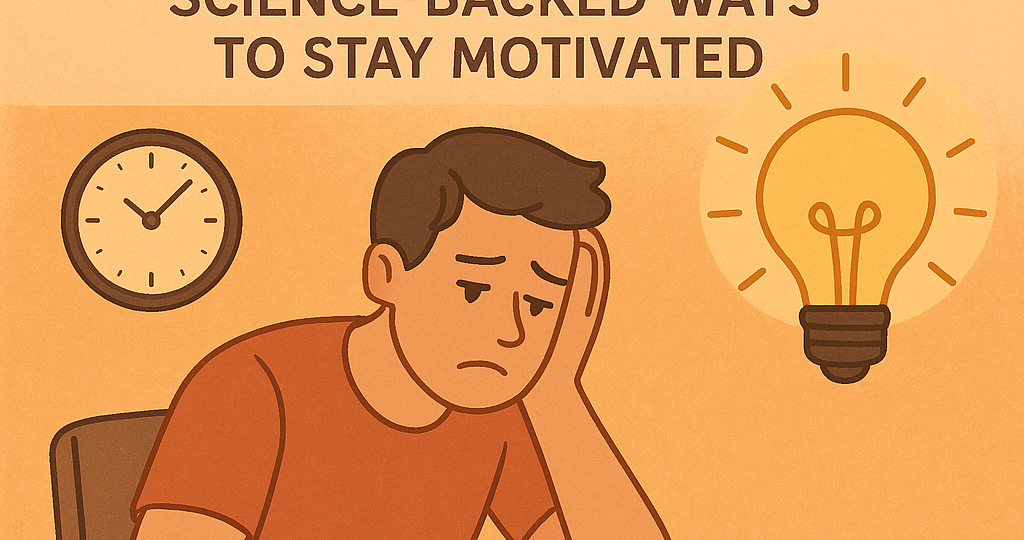
Why Do People Procrastinate? Science-Backed Ways to Stay Motivated
Introduction
We’ve all done it — delayed a task we knew we needed to finish. Sometimes we scroll on our phones, tidy up the house, or convince ourselves we’ll “do it tomorrow.” This is procrastination, and while it might seem harmless at first, it can lead to stress, missed opportunities, and frustration over time.
But why do people procrastinate? And how can we break the cycle? Understanding the reasons behind this habit and learning practical ways to stay motivated can help us take back control and get things done.
What Is Procrastination?
Procrastination is when we avoid or delay doing something, even when we know it’s important. It’s not just about being lazy. Most people procrastinate not because they don’t care, but because something about the task feels uncomfortable — maybe it’s boring, overwhelming, or connected to fear or self-doubt.
In short, procrastination is a way of coping with negative emotions related to a task. We choose short-term relief instead of long-term benefits.
Why Do We Procrastinate?
There are several common reasons people put things off. Once we understand them, it’s easier to find solutions.
1. Fear of Failure
If we’re worried that we won’t do something perfectly, we might avoid starting it altogether. Fear of making mistakes can make us freeze, even if we know avoiding the task won’t help.
2. Perfectionism
Some people set such high standards for themselves that they struggle to begin tasks. They may think, “If I can’t do it right, I won’t do it at all.”
3. Feeling Overwhelmed
Big tasks can feel like climbing a mountain. If we don’t know where to begin, it’s easier to do nothing. This leads to more stress, making the task feel even harder.
4. Lack of Motivation
When a task doesn’t feel interesting or rewarding, our brain naturally looks for something more enjoyable. That’s why social media, games, or chatting with friends often win over work or studying.
5. Poor Time Management
Sometimes we simply don’t plan well. If we leave everything for the last minute, it becomes harder to stay calm and focused.
How to Stay Motivated and Get Things Done
Luckily, there are many practical strategies that can help. These methods don’t require major life changes — just small shifts in how we think and work.
1. Break Big Tasks Into Small Steps
A big project can feel scary, but breaking it down into smaller, more manageable parts makes it easier to start. For example, instead of “write a report,” try “open a document,” “write an outline,” or “draft the introduction.”
Completing each step gives a sense of progress and boosts motivation to continue.
2. Use the “Just Start” Rule
Starting is often the hardest part. Tell yourself you’ll work on the task for just 5 or 10 minutes. Often, once you begin, it’s easier to keep going than you expected.
This small push helps overcome the initial resistance.
3. Set Clear and Simple Goals
Vague goals like “get some work done” are hard to act on. Instead, aim for specific actions like “finish the first two pages” or “review three client emails.” Clear goals are easier to tackle and track.
4. Reward Yourself
Promise yourself a reward after finishing a task. It can be a break, a snack, or time to watch a favorite show. Rewards give you something to look forward to and make hard work feel worthwhile.
5. Create a Productive Environment
Your surroundings matter. Try to remove distractions like phones or loud noise. A clean, calm space can help your mind focus. If possible, keep your workspace separate from where you relax.
6. Use a Timer or Work in Short Sprints
Techniques like the Pomodoro method (25 minutes of focused work followed by a 5-minute break) help keep your brain alert. Working in bursts makes tasks feel less draining.
7. Be Kind to Yourself
Beating yourself up for procrastinating only adds more stress. Instead, recognize that everyone struggles sometimes. Focus on what you can do next — not on what you haven’t done yet.
Final Thoughts
Procrastination is something almost everyone deals with at some point. It’s not a sign of weakness — it’s often a sign that something about a task feels too big, too boring, or too uncomfortable.
But by understanding why we procrastinate and using a few simple strategies, we can start to break the habit. With a bit of patience and self-awareness, staying motivated becomes easier — and getting things done feels much more rewarding.